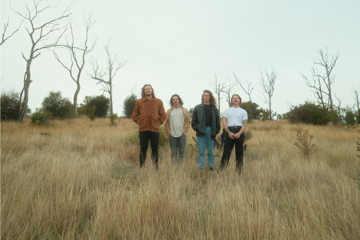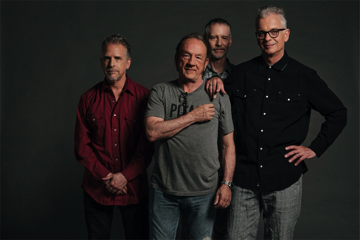Alex Cameron On Bad//Dreems' New Album, 'HOO HA': 'Bugger The Consequences'
"There was a significant possibility that we may never have been able to record or play together again."

Sometimes it feels like cheating to discuss the creation of an album in retrospect. It can feel like you are overlaying a grand manifesto on what was, at the time, just a collection of disparate ideas. It can feel like you are retrospectively granting yourself the status of some creative visionary when really you were stumbling blindly through a mess of words and sounds. It can feel like you have forgotten the hundreds of rejected ideas or bad takes and concocted some Archimedean counternarrative.
Considering all that, what follows are my most honest reflections on our fourth album HOO-HA!
Rock and roll catharsis
The plague years abruptly took away a very dear part of our lives: the opportunity to play rock and roll together. Its absence left a void that was very difficult to fill. It emphasised how much of our lives were an enmeshed community of other bands, creatives, techs and engineers that we know and love.
For me, there is a mindfulness to playing music and watching live music that I found very difficult to replicate. Music can also be something very cerebral, but very little compares to the catharsis of live rock and roll. So when we got the chance to make another album this was the idea that underpinned it. Returning to our roots in Adelaide and playing the type of music that comes to us instinctively: unadorned Rock and Roll.
Producer Dan Luscombe and engineer Andrew Idge were key to bringing this to life. Luscombe is a doyenne of Australian music and has a Yoda-like ability to make a big difference without seeming to do anything heavy-handed. As a musician and writer himself, he understands the studio dynamic very well. We ended up tracking everything in a week or so, which was much quicker than any other album we’ve made. Songs like Desert Television or Black Monday were the first or second take.
Don't miss a beat with our FREE daily newsletter
The Fatal Shore
Underneath the veneer of the comfortable suburban banality of Australia, there is another country. This country is timeless and vast. It’s a country that we explore in our songwriting. We aim to strip away the veneer and reveal the bizarre, dark, twisted beauty that lies beneath. We try to capture the experience of the everyday person but find within it the romance of the lost highways the Never-Never, the terrifying vastness of the outback, the sordid colonial origins of Australia and the dystopian future that awaits.
At school, we were taught of early agricultural trials and triumphs, such as Goyder’s line and the “stump-jump plough”. I found it boring at the time and I now realise that’s because it was. It’s a whitewashed history, which could apply to agricultural colonisation in numerous parts of the world.
It skips over the first 50 years of settlement, where the poorly planned and executed colony was a fetid mess of corrupt confusion, which almost failed several times. It skips over more than 60 000 years of Aboriginal civilisation – time so deep that it is almost unfathomable. It omits the wars fought by Aboriginal people to defend their sovereignty and the remarkable story of their survival. These are the stories that should be told and what we wrote about in songs like Jack and Mallee.
Ern Malley
Speaking of Mallee, the Ern Malley literary scandal was a hoax that took place in the 1940s, when two conservative writers took umbrage at the modernist approach taken by the Angry Penguins literary journal. They constructed the (deceased) Ern Malley figure and used a cut-up technique to produce his life’s work, which was “discovered” after his death. It was swallowed hook, line and sinker by Angry Penguins and Malley was hailed as a genius.
The publishers were humiliated. Funnily enough, it turns out the poetry is actually quite good, despite the intent behind its creation. This anecdote always makes me think about the creation of songs. Sometimes you write something that is direct and literal, like Jack. Other songs come together from some weird stream of consciousness, like New Breeze or Ben [Marwe]’s work on See You Tomorrow. Both can end up being as profound as the other.
Catharsis
Ben and I spent a long time discussing the characters that he steps into in our songs. He has always had an innate ability to do this, especially in a live setting. Sometimes the characters are perhaps unsavoury, like the protagonists in Waterfalls or Mansfield 6.0.
They are often critiques of the modern (white) Australian male, in all his confusion, angst, fear and (latent) violence. This portrayal is fraught, as we, to an extent, are they. We wonder whether this has confused our audience over the years. Regardless we feel we are in the position to stand against misogyny, chauvinism and boorishness, as well as the lowest common denominator portrayal of our culture that Australia often defaults to.
In Ben’s performances, we looked at referencing characters like Bad Boy Bubby from Rolf de Heer’s cult film, de Niro in Taxi Driver, Hopper in Apocalypse Now or Jack Nicholson in One Flew Over The Cuckoo's Nest and The Shining.
There is also the element of the Rasputin-type character: an opacity as to whether the character is a visionary or a lunatic.
Hee Haw
How was the album named? Ali [Wells, guitar], Ben and I were sitting in our Air BnB eating home delivery. I was watching the two of them play FIFA. I just watch, as I am terrible at playing video games on account of a childhood deprived of such essential activities.
Ben had done the vocals to New Breeze that day and had ad-libbed the phrase “Hee Haw”. I mentioned that it was a shame we couldn’t just call the album Hee Haw (The Birthday Party had got there first). Ben replied, “What about Hoo Ha?”. And that was it.
The title track was recorded on an Optigan, which is a weird 70s organ that took floppy vinyl discs and was sort of the first sampler by accident. One of these was being given away for free in Bendigo, near where I live. Luscombe found it and got me to pick it up for him. And it made its way onto the album.
There was a significant possibility that we may never have been able to record or play together again. If we were to do so I made a pledge to say exactly what I wanted to and make music true to only ourselves. Bugger the consequences. Hopefully, that was achieved in some way.
Bad//Dreems’ Ben Marwe and Alex Cameron are taking Hoo Ha to record stores near you. The week-long events will take place at:
Thursday 18 May – Trash Cult Records, Bendigo (5 PM)
Friday 19 May – Oh Jean Records, Melbourne (4 PM)
Saturday 20 May – Clarity Records, Adelaide (5 PM)
Sunday 21 May – Music Farmers, Wollongong (6 PM)
Monday 22 May – Young Henrys, Sydney (5 PM)
Tuesday 23 May – Hiss & Crackle, Newcastle (5 PM)
Wednesday 24 May – Thrills, Byron Bay (4 PM)
Thursday 25 May – Sonic Sherpa, Brisbane (5 PM)
Related Gigs









